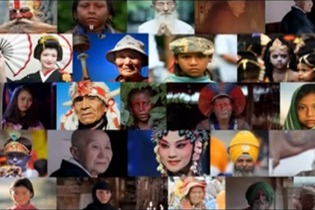UNESCO launches educational resource kit for Ukraine

On 3 July 2024 UNESCO organized the launch of a resource kit for teachers in the country that promotes an innovative methodology bringing together living heritage, education, and sciences - ‘Teaching and learning with living heritage in Ukraine’. This launch was organized by the Ministry of Culture and Information Policy and DEMCULT, with the support of the Ministry of Science and Education, National Commission of Ukraine for UNESCO, UNESCO Chair on Science Education, and the APSNet schools in Ukraine.
Attended by almost 500 people online with 60 people at the UKRINFORM, the event opened with a welcome address from Ms Anastasiia Koziar, Head of the Sector for the Safeguarding of Intangible Cultural Heritage at the Ministry of Culture and Information Policy, followed by Ms Svitlana Fitsailo, Head of the Department on Education Content, Mr Mykola Movchan, Deputy Permanent Delegate of Ukraine in UNESCO, Ms Min Jeong Kim, Director, UNESCO’s Division for Education 2030, and Ms Fumiko Ohinata, Secretary of the 2003 Convention for the Safeguarding of the Intangible Cultural Heritage.
Showcasing experiences from 12 pilot projects implemented in 2023 in primary and secondary schools across Ukraine, this resource kit for teachers features a methodology specifically for integrating living heritage in school-based education.
One notable example is the practice of forest beekeeping, which was incorporated into various subjects such as language arts, mathematics, history, chemistry, and biology at the École Française Internationale in Kyiv. Similarly, the crafting of clay toys introduced students to history, geography, chemistry, biology, physics, technology, art classes as well as 3D design technology.
A highlight was the screening of the video ‘More than a Toy - Students in Odesa Learn Sciences and Literature with Black Sea Clay Figurines’, showcasing the tangible impact of this innovative teaching approach.
The presentations by two of the pilot schools in Ukraine that followed the film underlined the positive impact of the project on their school communities.
In the second part of the meeting, Ms Olena Zinkevych from JRS Romania talked about a project focusing on intergenerational transmission of living heritage among temporarily displaced Ukrainians living in Romania, which was supported by the International Assistance mechanism under the Intangible Cultural Heritage Fund. Another experience was shared by Ms Katerina Christodoulou on how a small pilot project in Greece was scaled up to a national programme to integrate living heritage in the education system.
The development of this toolkit, supported by the Heritage Emergency Fund (HEF), was implemented in partnership with the Development Centre ‘Democracy through Culture’, a non-governmental organization (NGO) accredited under the 2003 Convention, based in Kyiv, Ukraine, in cooperation with the UNESCO Associated Schools Network in Ukraine (ASPnet schools); the training workshops were conducted by UNESCO facilitators under the 2003 Convention.

Address: 81, Laiguangying West Road, Chaoyang District, Beijing, China
Zip Code: 100021
Tel: 86-10-64966526
Fax: 86-10-64969281
E-mail: crihap@crihap.cn
Leave us your e-mail address, we'll let you know about current events.



